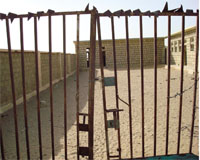
NDI: Revenge killing negatively impacts education system [Archives:2008/1154/Front Page]
May 12 2008
 |
SANA'A, May 11 ) Closing schools, suspension of teaching, missing classes and examinations and the general spreading of ignorance are the main negative impacts on education system caused by revenge killings.
The revenge killings take place in three particular governorates: Marib, Shabwa and Al-Jawf, according to the National Democracy Institute (NDI) that released the results of its survey on tribal conflict's effects on education last week.
The NDI survey showed that tribal conflicts, such as an in Marib where there are 38 unresolved blood feuds, led to the evacuation of many families and prevented students from attending schools.
The presentation was a result of surveys complied by three anti-revenge killing non-governmental organizations (NGOs) in the three governorates.
Future Association for Development and Social Peace in Marib Governorate, a local NGO, indicated that the spread of illiteracy and ignorance were the direct results of widespread revenge killing. The report indicated that 347 university students in Marib governorate couldn't take their final examinations because of revenge killing incidents. The report added that many students left the examination halls and were enforced to stay at home because of the violence.
The report from the Brothers Association for Development and Social Peace (BADSP) in Shabwa revealed that the Setnan school, built in 1992, was blasted by mines in 2001 due to a revenge conflict. The report stated that the construction of Al-Jarasha, another school in the region, was stopped due to a tribal dispute over the land. The report added that many students were compelled to go to school carrying weapons because of tribal conflicts.
The Association for Peace and Development (APD) in Al-Jawf disclosed that more than eight schools in Al-Mazareq and Al-Saidah districts, which contain hundreds of students, have stopped classes indefinitely since the outbreak of tribal war three years ago. The tribal warfare also killed more than 30 people while injuring 30 others.
As a result of these continued feuds, the National Democratic Institute for International Affairs (NDI) launched a campaign to reduce the impact of conflict on education in Marib, Al-Jawf and Shabwa governorates under the auspices of the Minister of the Interior, Dr. Rashad Al-Alimi, and the head of the National Commission on Tackling Conflict Issues.
“We are only focusing on these three governorates because they are the most affected,” stated Peter Dimitroff, the Resident Director of the NDI. “Certainly, we would like to expand these programs and replicate them through the rest of the affected areas.”
Though blood money plays an important role in stopping revenge killing, NDI doesn't intend to pay blood money as it is a short-term solution. “The NDI don't have the ability to generate a fund towards paying blood money. But even if we did, I think that would be the wrong approach because though it is effective in stopping in a short-term conflict, it is like putting on a bandage,” noted Dimitroff. He also pointed out that most of the tribal conflicts in these areas are a function of the lack of viable government presence, especially regarding land disputes. “They lack a land registry system,” said Dimitroff.
The campaign's general framework and activities were discussed and approved during a workshop which was held in Aden during April 20 to 23. It focused on uncovering the impact of conflict on education, reinforcing the role of local NGOs, media, mosque and religious institutions, tribal leaders, women and youth along with authorities in raising awareness about the impact of conflict on education. The campaign also aims to advocate and lobby the government to protect education from revenge killing and conflict.
The campaign will take action this Month and run through August. It is supported by NDI's Conflict Management Program, which is funded by United States Agency for International Development, known as USAID.
——
[archive-e:1154-v:18-y:2008-d:2008-05-12-p:front]


